East side of 7th Floor, No. 3663, North
Zhongshan Road, Shanghai, China, 200062
Tel: +86 21 6223 2322
www.smile.ecnu.edu.cn
Bridging Eastern and Western Wisdom in Climate Change Education through Intergenerational Learning for Sustainable Development.
The year of 2025 marks the fifth anniversary of China’s “dualcarbon goals”(reaching peak carbon emissions before 2030 and achieving carbon neutrality before 2060), the tenth anniversary of the Paris Agreement, the twentieth anniversary of the “Lucid waters and lush mountains are invaluable assets” concept, and the 30th UN Climate Change Conference (COP30). Faced with many uncertainties in international climate actions, China has responded resolutely to address global concerns. “No matter how the world may change, China will not slow down its climate actions, will not reduce its support for international cooperation, and will not cease its efforts to build a community with a shared future for mankind.”
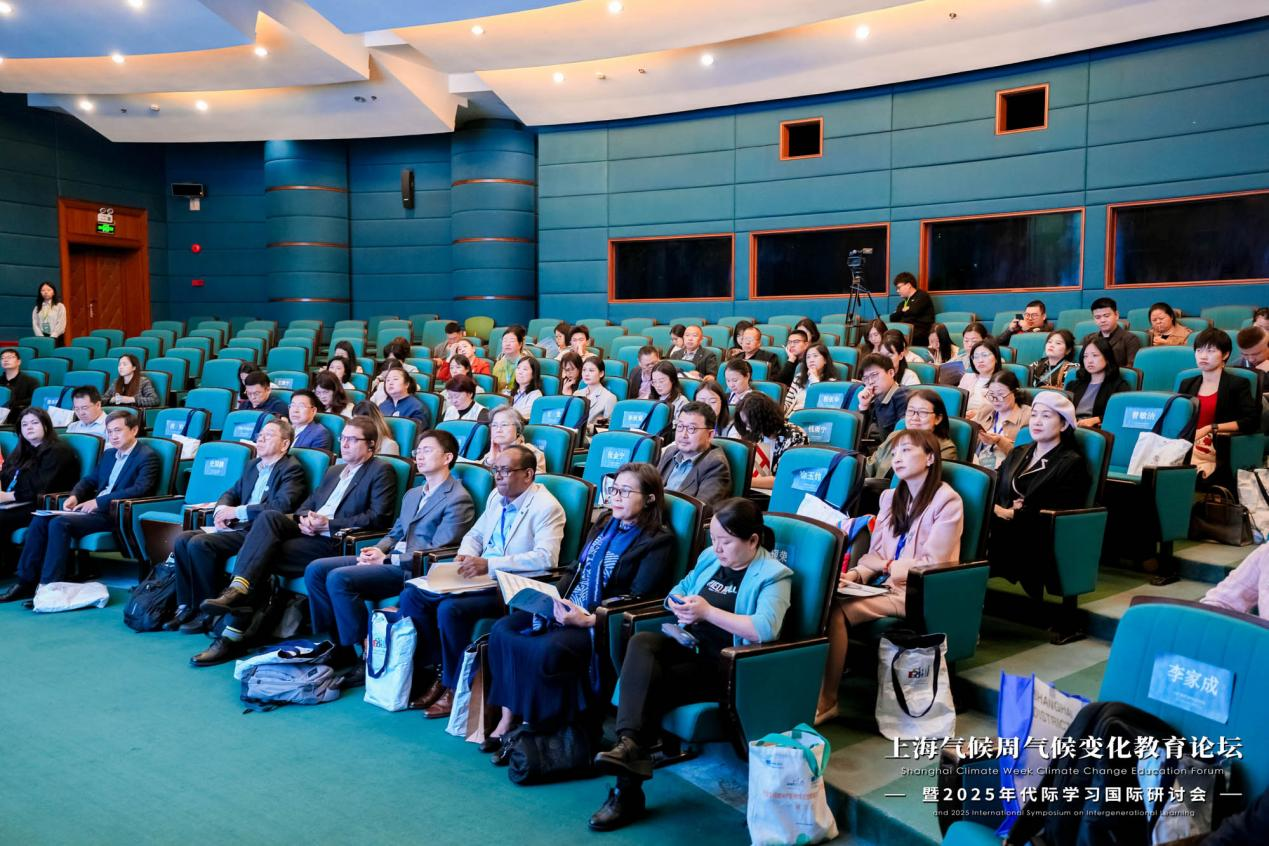
Shanghai Climate Week Climate Change Education Forum and 2025 International Symposium on Intergenerational Learning Held at East China Normal University (ECNU)
Against this background, the Shanghai Climate Week Climate Change Education Forum and 2025 International Symposium on Intergenerational Learning were held at East China Normal University (ECNU) on April 25. Renowned scholars from international organizations such as UNESCO, UNICEF, Save the Children and countries such as the UK, South Korea, Thailand, Japan, the Gambia, South Africa, as well as Chinese experts gathered on the banks of the Liwa River in April to map collaborative innovation in Climate Governance though intergenerational learning.
Bringing together 11 internationally renowned scholars and 15 domestic frontline educators, the conference has showcased their latest research and case studies in the field of intergenerational climate change education, and it has systematically presented the global wisdom and Chinese actions in this field through thematic reports, report on the achievements, and expert commentary. The conferencehas attracted nearly 200 on-site participants from all over China, including school principals and teachers, education bureau officials, scholars from research institutes specializing in intergenerational education, climate change education and lifelong education, while over 6,000 attended via live stream.
At the opening ceremony, addresses were delivered by Li Zhengtao, Vice President of the Chinese Society of Education, Shi Guopeng, Director of Division of School Education, Center for Environmental Education and Communications of Ministry of Ecology and Environmentof the People’s Republic of China, and Zou Rong, Chairman of the Executive Committee of Shanghai Climate Week. Li Jiacheng, Executive Vice President of Shanghai Municipal Institutefor Lifelong Education presided over the opening ceremony.
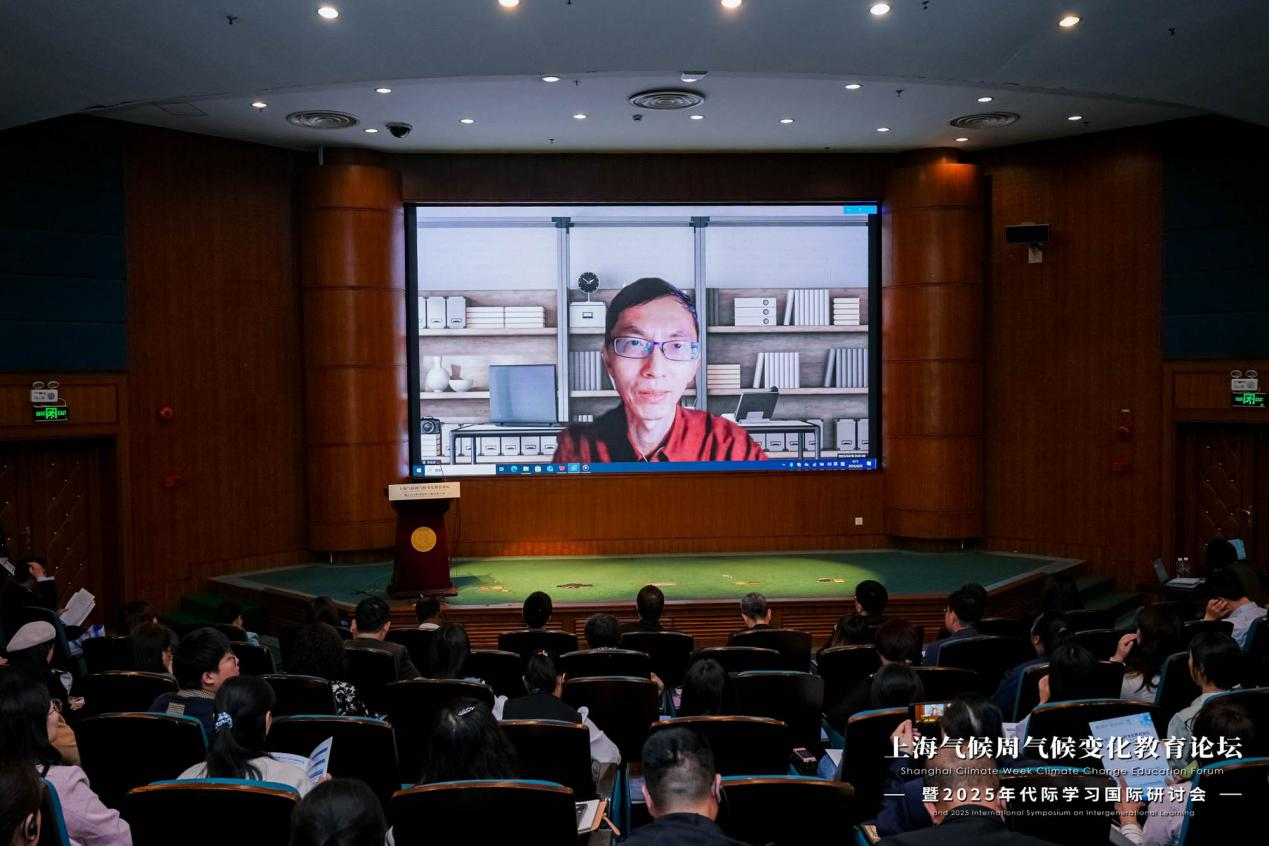
Li Zhengtao, Vice President of the Chinese Society of Educationand Directorof the Institute of Schooling Reform and Development of ECNU gave a video speech.
Li Zhengtao, Vice President of the Chinese Society of Educationand Directorof the Institute of Schooling Reform and Development of ECNUreviewed the practical accomplishments of ECNU in climate education. Over the past year, ECNU has systematically documented nearly 40 innovative cases, successively held the third and fourth “Seminar on Climate Change Education through Collaboration between Schools, Families and Society”, published Climate Change Education: China in Action (First Series), and developed the world’s first Guidelines for Climate Change Education (Elderly Education Edition)and Guidelines for Climate Change Education (School-Enterprise Collaboration Version). These initiatives effectively leveraged the ecological wisdom of the elderly and promoted Industry-University-Research innovation. Li emphasized that ECNU’s intergenerational learning model “the elderly and children”hadprovided a key support for building a climate education system spanning the entire life cycle and showcased the innovative value of China’s climate change education by bridging generational cognitive gaps through knowledge exchange and awakening cross-generational responsibility via emotional resonance.
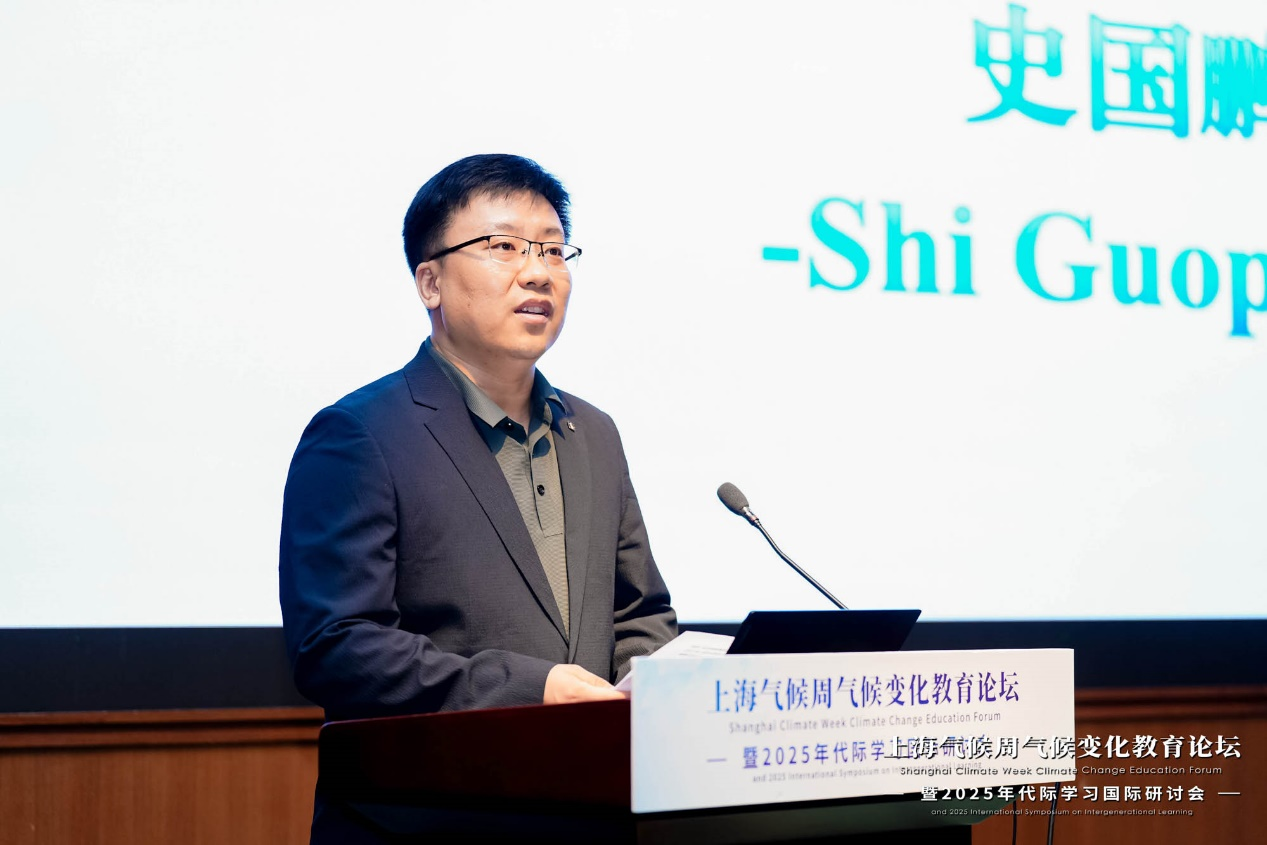
Shi Guopeng, Director of Division of School Education, Center for Environmental Education and Communications of Ministry of Ecology and Environmentof the People’s Republic of China
Shi Guopeng, Director of Division of School Education, Center for Environmental Education and Communications of Ministry of Ecology and Environmentof the People’s Republic of China, emphasized in his address that climate change is no longer a distant crisis but an immediate threat. China has achieved remarkable results in building an ecological civilization, achieving 6% annual economic growth with just 3% yearly energy consumption growth and becoming the country with the fastest improvement in air quality and the largest use of renewable energy in the world. The Center for Environmental Education and Communicationsis very concerned about youth-centered environmental protection efforts. Through the continuous practice of “Meijing Action” (Beautiful Environment Action) for 29 years, the construction of more than 700 international eco-schools, and the inclusion of the water-tech invention competitions in the Ministry of Education’s approved list of student activities, the Ministry of Ecology and Environment has trained numerous environmental pioneers nationwide and built influential environmental education exchange platforms at home and abroad.
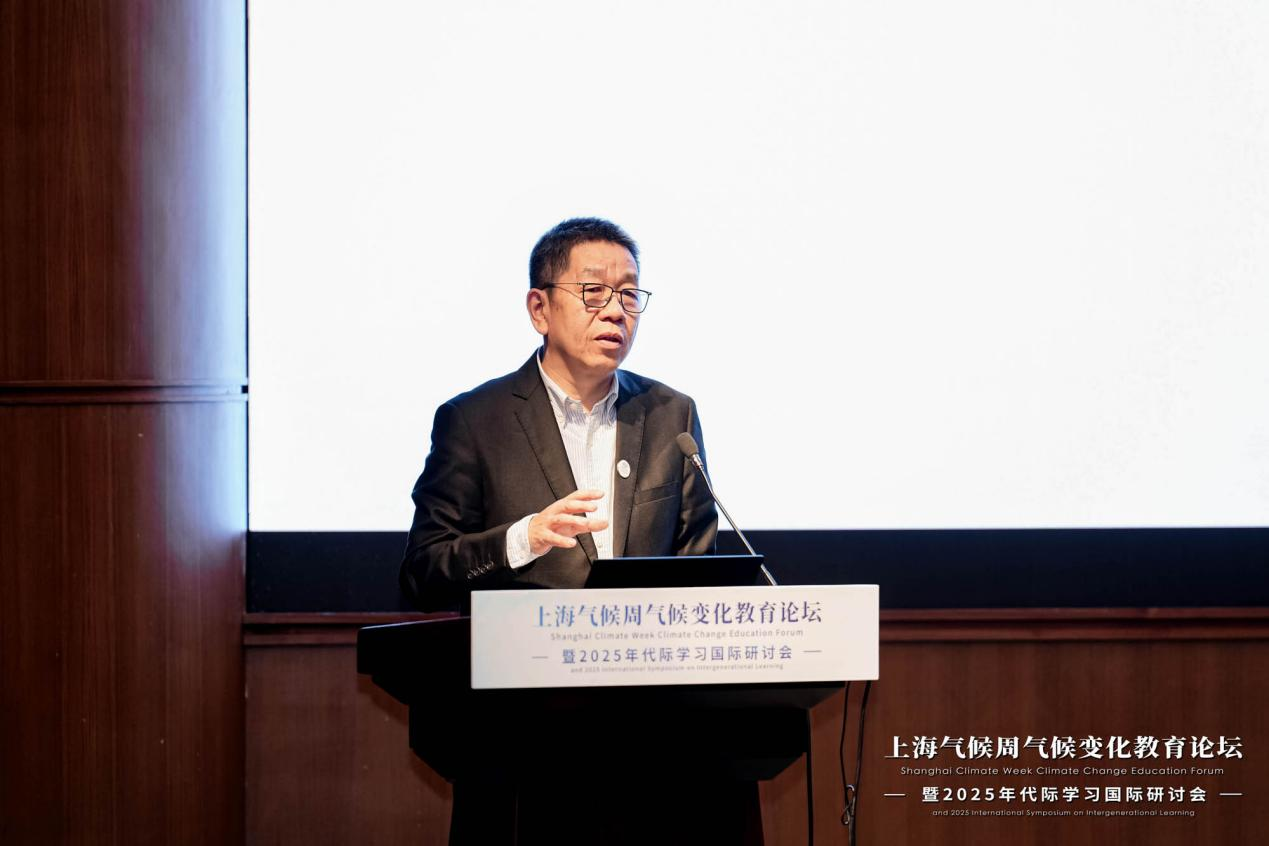
Zou Rong, Chairman of the Executive Committee of Shanghai Climate Week
Zou Rong, Chairman of the Executive Committee of Shanghai Climate Week, announced that the 2025 Shanghai Climate Week will feature over 70 sessions with participation from more than 30 countries worldwide. He highlighted three key initiatives currently under development. Firstly, the “Climate Beacon” project has attracted participation from global industry leaders including Rockwell Automation and Deloitte, already generating $2.3 billion in green market value in 2024. Secondly, through collaboration with Climate Weekin London and New York , Shanghai Climate Week has formed a “Climate week four seasons”mechanism. Lastly, the standard system of “Climate Park”, which incorporates Eastern ecological wisdom, is being formed by organically combining environmental, educational and cultural indicators. In the end, by quoting “There is a crack in everything, That's how the light gets in”, Zou called for optimizing the global climate governance paradigm with Chinese actions and amplifying developing nations’ voices through Asian leadership.
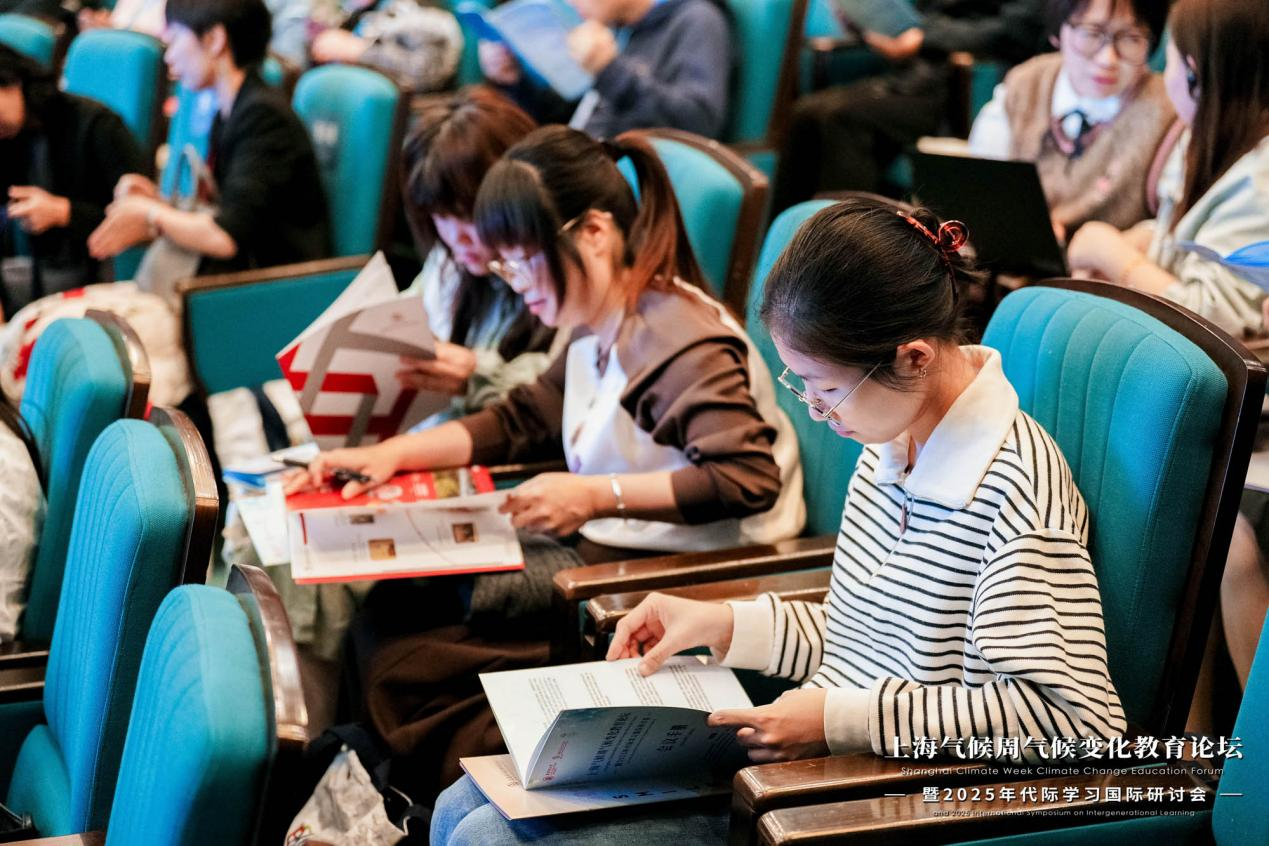
Symposium Venue
In the release session, the Shanghai Municipal Institute for Lifelong Education (SMILE) systematically released two recent landmark research results: the selected cases of China’s Action on Climate Change Education: Focusing on School-Enterprise Collaboration (Chinese-English Bilingual·Second Series) and the Guidelines for Climate Change Education (Intergenerational Learning Edition), while the research consortium “Promoting the Coordination of Three Education Sectors through Climate Change Education” (The collaborative innovation and development ofhigher education, vocational education and continuing education through climate change education) was officially launched. The release of these results has consolidated and improved the multidimensional framework of theoretical leadership, practical innovation, mechanism breakthrough and international dialogue that has been formed by SMILE in climate change education, which will radiate the whole country and foster global dialogue through diverse channels.
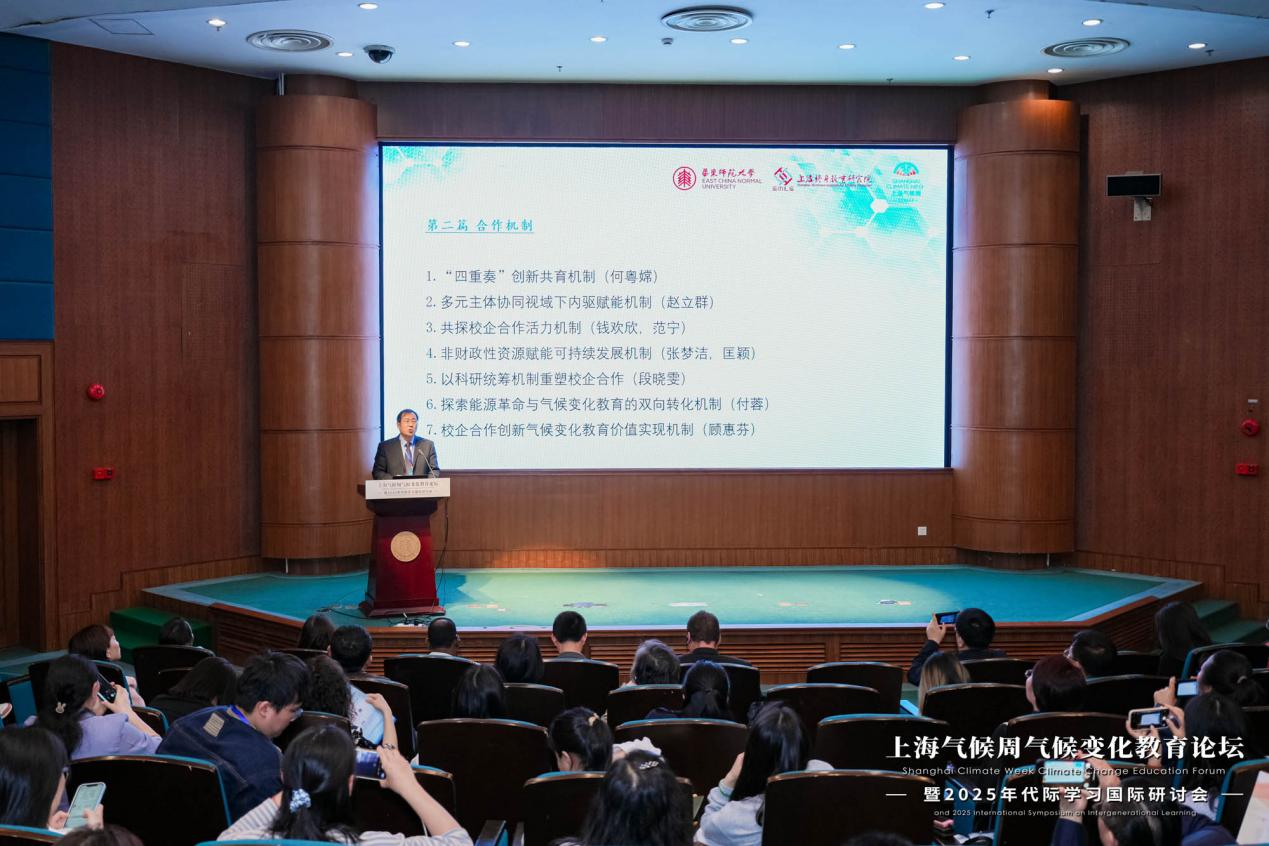
President Li Jiacheng announced the selected cases in China’s Action on Climate Change Education: Focusing on School-Enterprise Collaboration (Chinese-English Bilingual·Second Series).
Following the Institute’s release of China’s Action on Climate Change Education (Chinese-English Bilingual·First Series) at the sixth International Conference on Learning Cities (ICLC 6) in December, 2024, China’s Action on Climate Change Education: Focusing on School-Enterprise Collaboration (Chinese-English Bilingual·Second Series) highlights the pivotal role of school-enterprise collaboration in advancing climate change education. This edition features a series of original achievements.
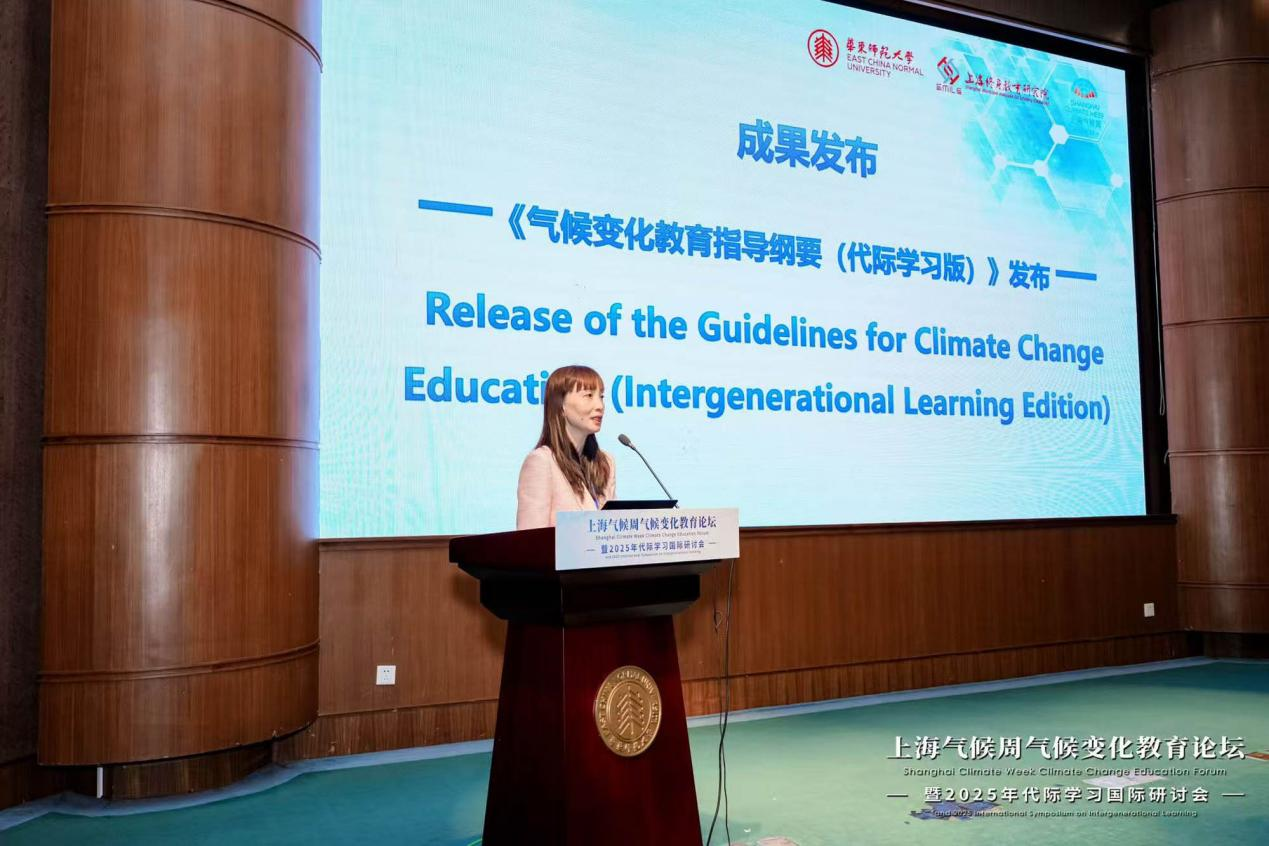
Principal Gu Huifen introduced the Guidelines for Climate Change Education (Intergenerational Learning Edition) in the results release session.
Officially released by Shanghai Municipal Institute for Lifelong Education(SMILE) and the National Research Alliance for Climate Change Education, the Guidelines for Climate Change Education (Intergenerational Learning Edition) has innovatively proposedthat grandparents and grandchildren should be the main participants. Through the three major paths of intergenerational interaction, intergenerational synergy and intergenerational radiation, it systematically builds an education system that includes four major modules, namely, climate awareness, climate skills, climate action and climate ethics. The book has especially stressed the advantages of the traditional ecological wisdom of the elderly and the innovative practical ability of young people, and promoted the integration of climate change education into families, schools and communities under the guidance of the four principles-mutual learning and harmonious integration, local action, emotional bonding, and healthy sustainability, thus providing innovative educational solutions to building a learning society and addressing the challenges of aging society. This is a new development following the Guidelines for Climate Change Education, the Guidelines for Climate Change Education (School-Enterprise Cooperation Edition) and the Guidelines for Climate Change Education (Elderly Education Edition), which marks that the study is gradually forming a complete theoretical system and practical framework.
The Research Consortium “Promoting the Coordination of Three Education Sectors through Climate Change Education”(The collaborative innovation and development ofhigher education, vocational education and continuing education through climate change education) announced at the conference is led by East China Normal University(ECNU), and brings together diverse groups such as universities, vocational colleges, basic education institutions, and administrative departments, including the China-UK Low Carbon College of Shanghai Jiao Tong University, Dongying Vocational College, Harbin Health School, Shanghai Jinshan District Youth Practice Center, Longhutang Experimental Primary School in Xinbei District of Changzhou City, Jiangsu Province, the Shunyi District Community Education Center in Beijing, and the Education Bureau of Chancheng District in Foshan City, Guangdong Province, etc.The Research Consortium has built up a cross-regional networkacross different educational levels. With climate change education as the axis, the Research Consortium will promote the collaborative innovation and development of higher education, vocational education and continuing education.
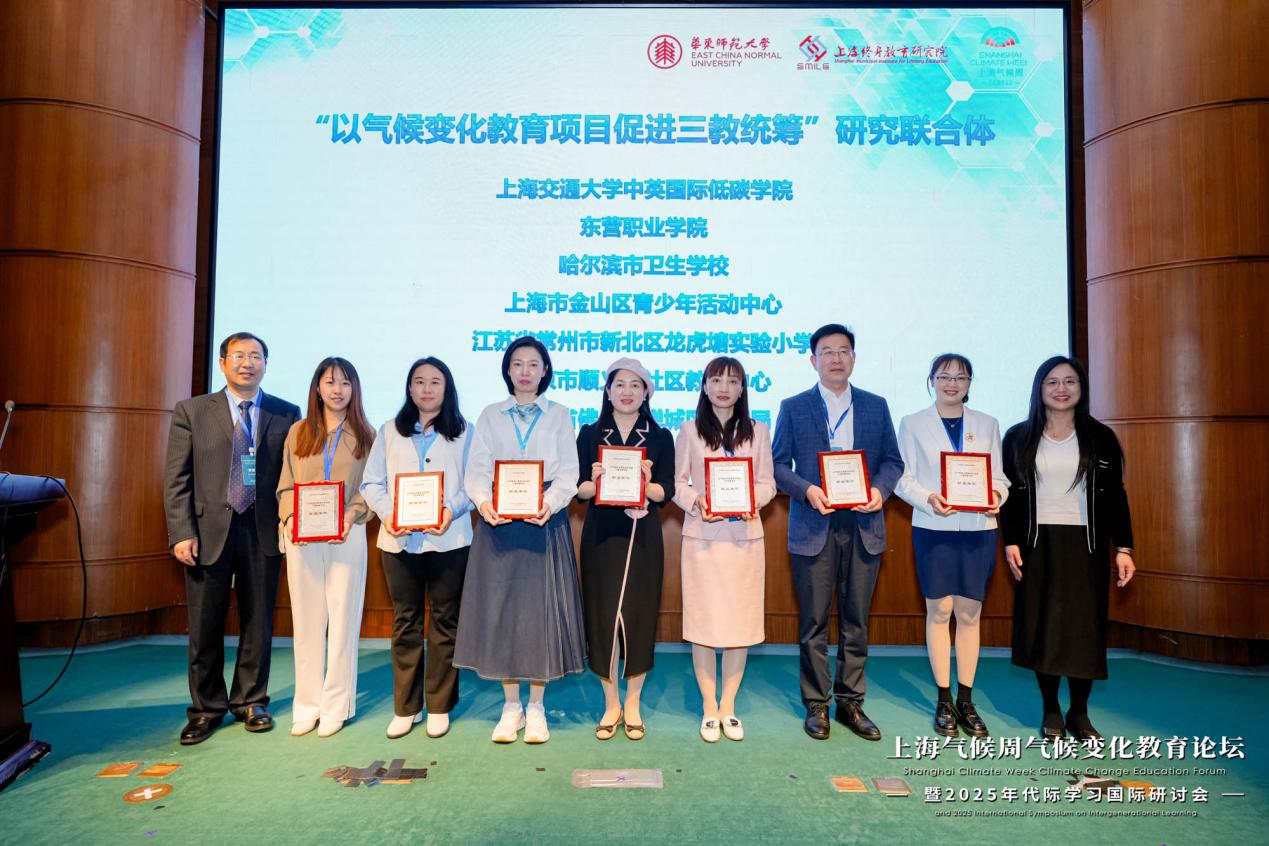
Awarding Ceremony for the Research Consortium “Promoting the Coordination of Three Education Sectors through Climate Change Education”
At the forum, domestic and foreign experts unanimously recognized China’s innovative contributions in the field of climate change education. A British scholar pointed out,“the discipline-integrated curriculum developed by school-enterprise cooperation in Shanghai provides a replicable path for global climate education.” The representative from South Korea praised the model of “intergenerational learning between the elderly and young people”, saying that it “injects vitality into climate action in an aging society”. Experts from UNESCO, UNICEF, Thailand, Japan, South Africa and other countries expressed their appreciation for the results developed by Chinese kindergartens, primary and secondary schools, and universities for the elderly, and indicated the need to strengthen close cooperation and mutual learning.
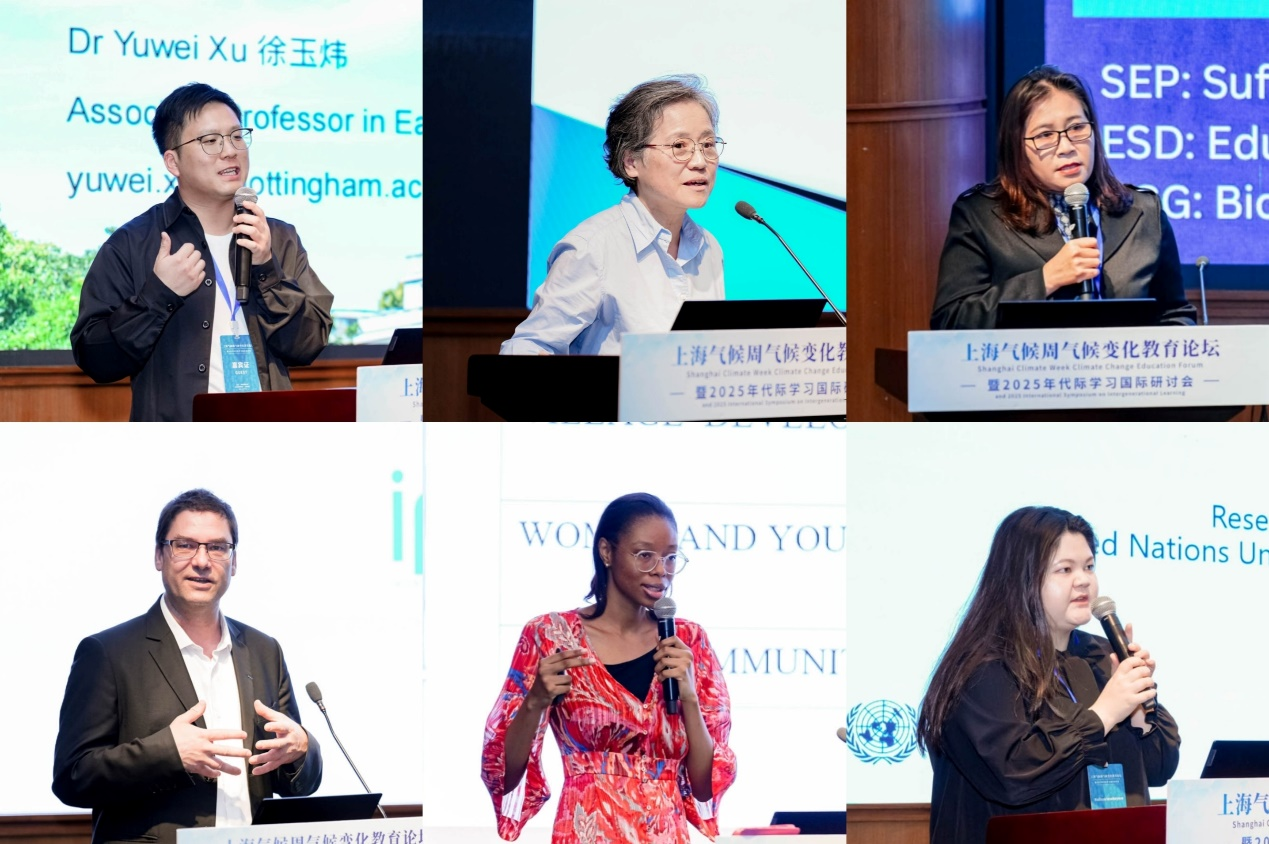
Experts from multiple countries gave exchange speeches.
In the future, the Shanghai Municipal Institute for Lifelong Education(SMILE) will deeply study the spirit of the Remarks by Xi Jinping, President of the People’s Republic of China at the Leaders Meeting on Climate and the Just Transitionon April 23, take the National Research Alliance on Climate Change Education and the National Research Alliance on Intergenerational Learning as a link, cooperate with the alliance units of the collaborative innovation and development of “Three Education” to carry out in-depthand comprehensive research and international cooperation, continue to explore ways to promote the harmonious coexistence of human beings and nature through climate change education, promote the building of a clean, beautiful and sustainable world through intergenerational learning and lifelong learning for all people, and contribute China’s wisdom and educational programs to global climate governance.
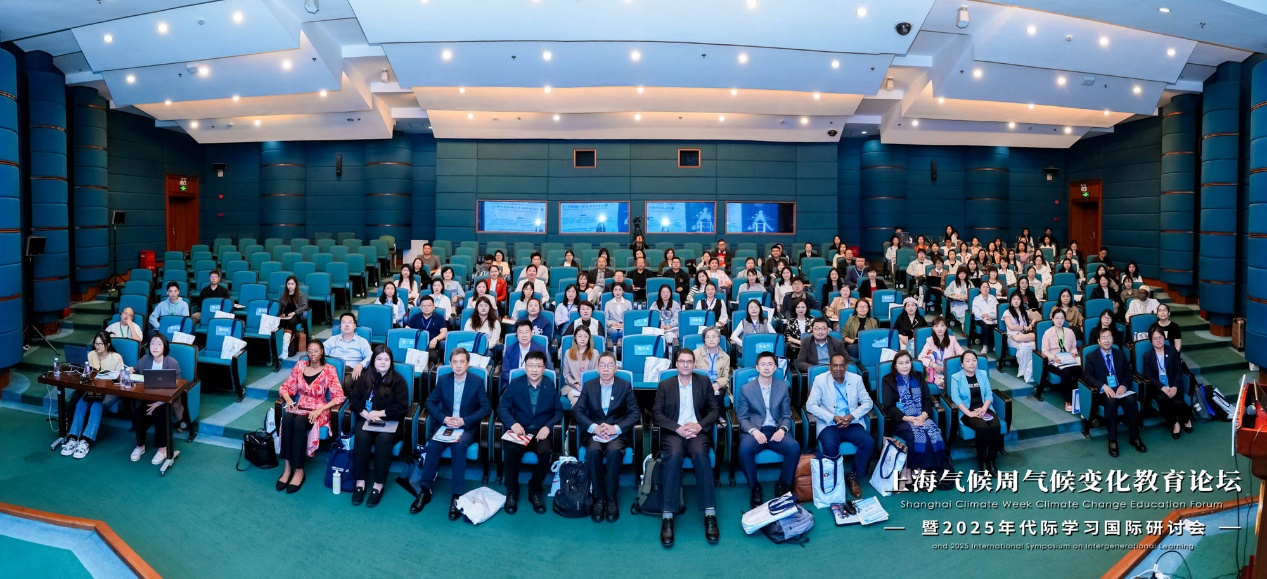
Group Photo of Shanghai Climate Week Climate Change Education Forum and 2025 International Symposium on Intergenerational Learning